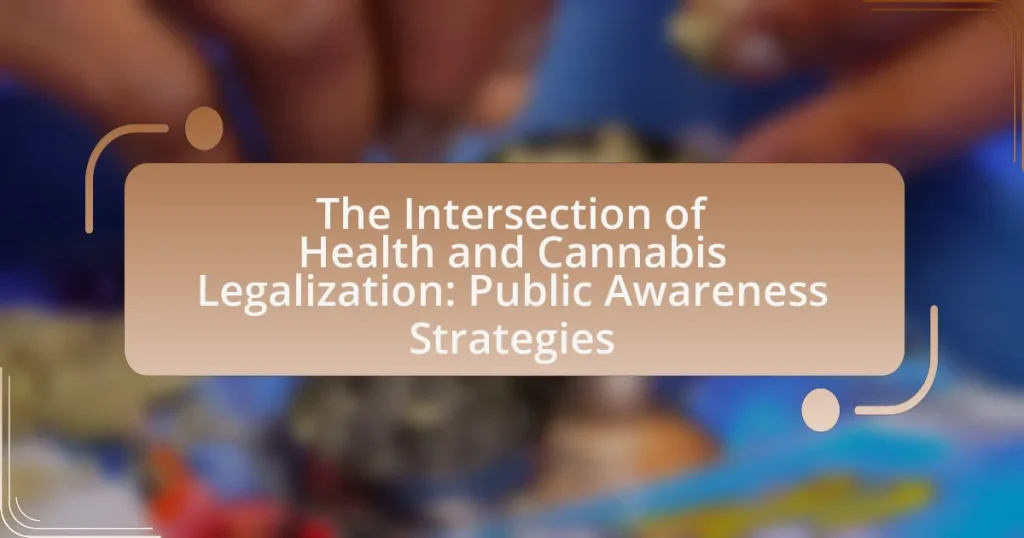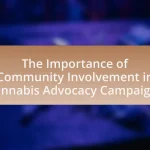The article examines the intersection of health and cannabis legalization, focusing on public awareness strategies. It highlights the therapeutic benefits of cannabis, such as pain relief and management of anxiety, while also addressing associated health risks, including increased substance use disorders and mental health issues among adolescents. The discussion emphasizes the importance of public awareness in shaping informed opinions about cannabis, the role of education in dispelling misinformation, and effective community engagement methods. Additionally, it outlines best practices for implementing awareness campaigns and measuring their effectiveness to promote a better understanding of cannabis health issues.
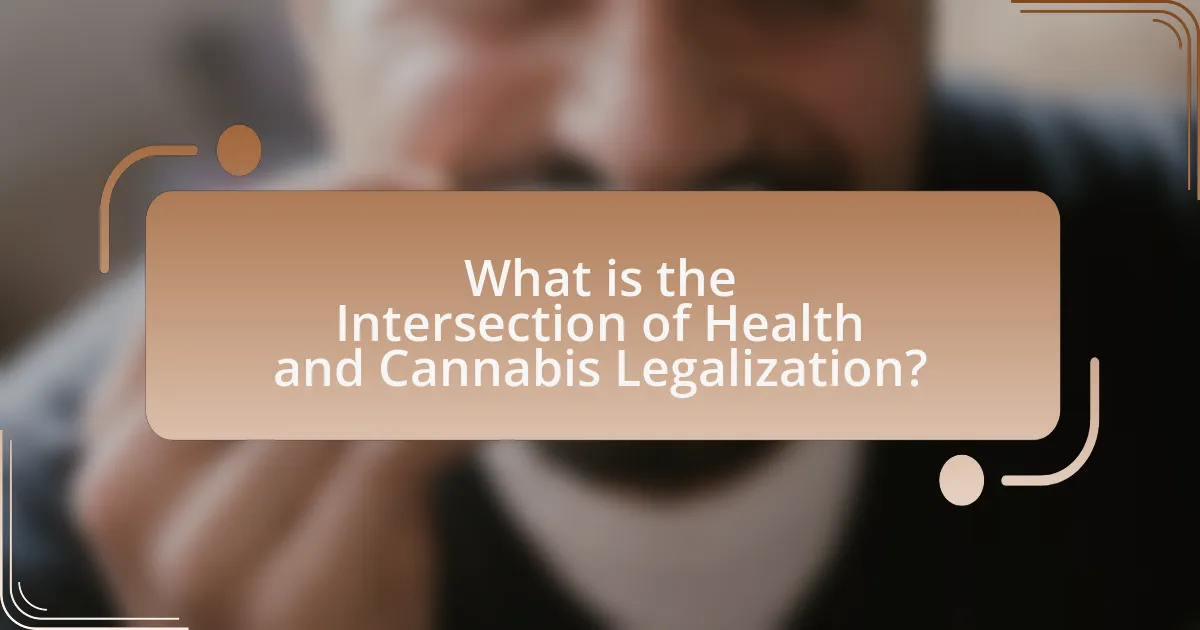
What is the Intersection of Health and Cannabis Legalization?
The intersection of health and cannabis legalization involves the impact of legal cannabis on public health outcomes, including both potential therapeutic benefits and risks. Research indicates that cannabis can alleviate symptoms of various medical conditions, such as chronic pain, epilepsy, and multiple sclerosis, leading to its increasing acceptance in medical contexts. For instance, a study published in the Journal of the American Medical Association found that states with legalized medical cannabis reported lower opioid overdose rates, suggesting a potential role in pain management. However, legalization also raises concerns about mental health issues, particularly among adolescents, as studies have linked increased cannabis use to higher rates of anxiety and depression. Thus, the intersection of health and cannabis legalization is characterized by a complex balance of therapeutic benefits and public health risks.
How does cannabis legalization impact public health?
Cannabis legalization impacts public health by potentially increasing access to cannabis for both medicinal and recreational use, which can lead to both positive and negative health outcomes. Research indicates that legalization can improve access to cannabis for patients with chronic pain, epilepsy, and other conditions, thereby enhancing their quality of life. For instance, a study published in the Journal of Health Economics found that states with legalized medical cannabis saw a 25% reduction in opioid overdose deaths, suggesting a potential substitution effect. Conversely, increased availability may also lead to higher rates of cannabis use among adolescents, which can negatively affect cognitive development and mental health. A report from the National Institute on Drug Abuse highlighted that states with legalized cannabis reported increased rates of cannabis use among youth. Thus, while cannabis legalization can provide therapeutic benefits, it also poses risks that need to be managed through public health strategies.
What are the potential health benefits of cannabis use?
Cannabis use has potential health benefits, including pain relief, reduction of inflammation, and management of anxiety and depression. Research indicates that cannabinoids, such as THC and CBD, interact with the body’s endocannabinoid system, which plays a role in regulating pain and mood. A study published in the Journal of Pain found that cannabis can significantly reduce chronic pain in patients, demonstrating its efficacy as a pain management tool. Additionally, a review in the Journal of Clinical Psychology highlighted that cannabis may alleviate symptoms of anxiety and depression, providing a therapeutic alternative for individuals who do not respond well to traditional medications.
What health risks are associated with cannabis legalization?
Cannabis legalization is associated with several health risks, including increased rates of substance use disorders, mental health issues, and respiratory problems. Research indicates that legalization can lead to higher consumption rates, particularly among adolescents, which is linked to an increased risk of developing cannabis use disorder. A study published in the journal “JAMA Psychiatry” found that states with legalized cannabis saw a 25% increase in cannabis use among adolescents. Additionally, cannabis use has been associated with mental health disorders such as anxiety and depression, with evidence suggesting that heavy use can exacerbate these conditions. Furthermore, smoking cannabis can lead to respiratory issues similar to those caused by tobacco smoking, as highlighted in a report by the National Academies of Sciences, Engineering, and Medicine, which noted that cannabis smoke contains harmful chemicals that can affect lung health.
Why is public awareness important in the context of cannabis legalization?
Public awareness is crucial in the context of cannabis legalization because it informs the public about the benefits and risks associated with cannabis use, thereby shaping informed opinions and behaviors. Increased awareness can lead to better understanding of cannabis as a medicinal option, as evidenced by studies showing that informed patients are more likely to use cannabis for therapeutic purposes. Furthermore, public awareness campaigns can address misconceptions and stigma surrounding cannabis, which is essential for fostering a supportive environment for legalization. For instance, research from the National Institute on Drug Abuse indicates that education about cannabis can reduce fear and misinformation, promoting a more rational discourse on its legalization.
How does misinformation affect public perception of cannabis?
Misinformation significantly distorts public perception of cannabis by perpetuating myths and misconceptions about its effects and legality. For instance, studies indicate that false narratives, such as the belief that cannabis leads to increased crime or severe health issues, can lead to negative attitudes and stigma surrounding its use. According to a 2020 survey by the Pew Research Center, 62% of Americans believe that cannabis should be legal, yet misinformation can create hesitancy among certain demographics, particularly older adults, who may rely on outdated or incorrect information. This disconnect highlights how misinformation can hinder informed decision-making and public acceptance of cannabis legalization.
What role does education play in shaping public attitudes towards cannabis?
Education plays a crucial role in shaping public attitudes towards cannabis by providing accurate information and dispelling myths. Research indicates that educational initiatives, such as public awareness campaigns and school-based programs, significantly influence perceptions of cannabis, leading to more informed opinions. For instance, a study published in the Journal of Drug Issues found that states with comprehensive cannabis education programs reported a decrease in stigma and an increase in acceptance of cannabis use for medical purposes. This demonstrates that well-structured educational efforts can effectively alter public attitudes, fostering a more nuanced understanding of cannabis and its implications for health and society.
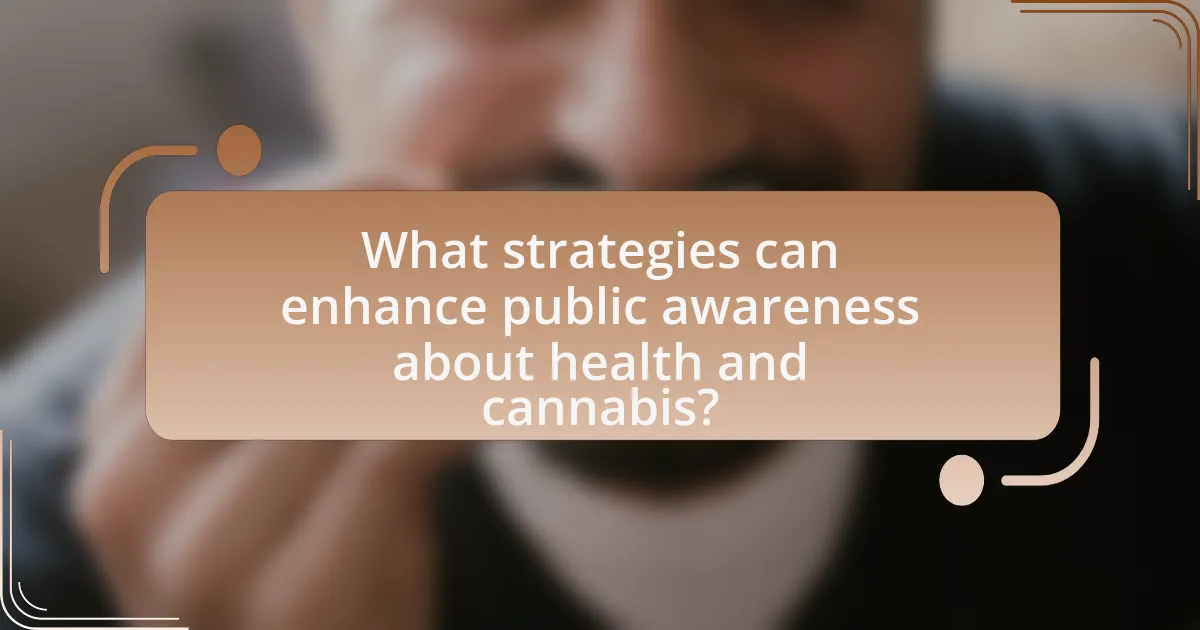
What strategies can enhance public awareness about health and cannabis?
To enhance public awareness about health and cannabis, implementing educational campaigns that provide accurate information is essential. These campaigns can utilize various platforms, including social media, community workshops, and public service announcements, to reach diverse audiences. Research indicates that targeted educational initiatives can significantly improve knowledge and attitudes towards cannabis, as evidenced by a study published in the Journal of Cannabis Research, which found that informed individuals are more likely to understand both the potential benefits and risks associated with cannabis use. Additionally, collaboration with healthcare professionals to disseminate evidence-based information can further legitimize the messaging and encourage informed discussions within communities.
How can community engagement improve awareness of cannabis health issues?
Community engagement can significantly improve awareness of cannabis health issues by fostering open dialogue and education within local populations. Engaging community members through workshops, informational sessions, and peer-led discussions allows for the dissemination of accurate information regarding the health effects of cannabis use. For instance, studies have shown that community-based interventions can lead to increased knowledge about both the therapeutic benefits and potential risks associated with cannabis, as evidenced by a 2020 study published in the Journal of Cannabis Research, which found that community outreach programs effectively raised awareness and understanding of cannabis-related health issues among participants. This direct involvement not only empowers individuals with knowledge but also encourages them to share information within their networks, amplifying the overall impact on public awareness.
What are effective methods for community outreach regarding cannabis?
Effective methods for community outreach regarding cannabis include educational workshops, partnerships with local organizations, and social media campaigns. Educational workshops provide accurate information about cannabis, its uses, and legal status, helping to dispel myths and reduce stigma. Collaborating with local organizations, such as health clinics and community centers, can enhance credibility and reach diverse populations. Social media campaigns can effectively engage younger audiences, utilizing platforms like Instagram and Facebook to share informative content and promote community events. Research indicates that community-based approaches increase public awareness and acceptance of cannabis, as seen in studies conducted by the National Institute on Drug Abuse, which highlight the importance of informed discussions in changing perceptions.
How can local organizations collaborate to promote accurate information?
Local organizations can collaborate to promote accurate information by forming partnerships that leverage their collective resources and expertise. These collaborations can include joint educational campaigns, sharing research findings, and hosting community forums to discuss cannabis-related health issues. For instance, organizations can utilize social media platforms to disseminate verified information, ensuring that the public receives consistent messaging. Research indicates that community-based interventions, such as those outlined in the “Community Engagement in Health Promotion” study by the Centers for Disease Control and Prevention, enhance the effectiveness of public health messaging by fostering trust and credibility among local populations.
What role do social media and digital platforms play in public awareness?
Social media and digital platforms significantly enhance public awareness by facilitating rapid information dissemination and engagement. These platforms allow health organizations, advocates, and policymakers to share educational content about cannabis legalization, its health implications, and legal changes in real-time. For instance, a study by the Pew Research Center found that 69% of adults in the U.S. use social media, making it a powerful tool for reaching diverse audiences. Additionally, campaigns on platforms like Facebook and Twitter can mobilize community discussions and increase visibility for health-related issues, thereby influencing public perception and knowledge about cannabis.
How can social media campaigns effectively communicate health information about cannabis?
Social media campaigns can effectively communicate health information about cannabis by utilizing targeted messaging, engaging visuals, and evidence-based content. Targeted messaging ensures that the information reaches specific demographics, such as young adults or medical patients, who may benefit from tailored health insights. Engaging visuals, including infographics and videos, can simplify complex information, making it more accessible and shareable. Evidence-based content, supported by research from credible sources like the National Institute on Drug Abuse, enhances the reliability of the information shared, fostering trust among the audience. For instance, studies indicate that clear, factual communication about the benefits and risks of cannabis can lead to informed decision-making among users.
What are the challenges of using digital platforms for cannabis education?
The challenges of using digital platforms for cannabis education include misinformation, regulatory restrictions, and audience engagement. Misinformation can spread rapidly on digital platforms, leading to confusion about cannabis benefits and risks; a study by the Journal of Cannabis Research found that 70% of online cannabis information is inaccurate. Regulatory restrictions often limit the types of content that can be shared, as many platforms have policies against promoting cannabis-related products, which can hinder educational outreach. Additionally, engaging diverse audiences can be difficult due to varying levels of knowledge and stigma associated with cannabis use, making it challenging to create content that resonates with all demographics.
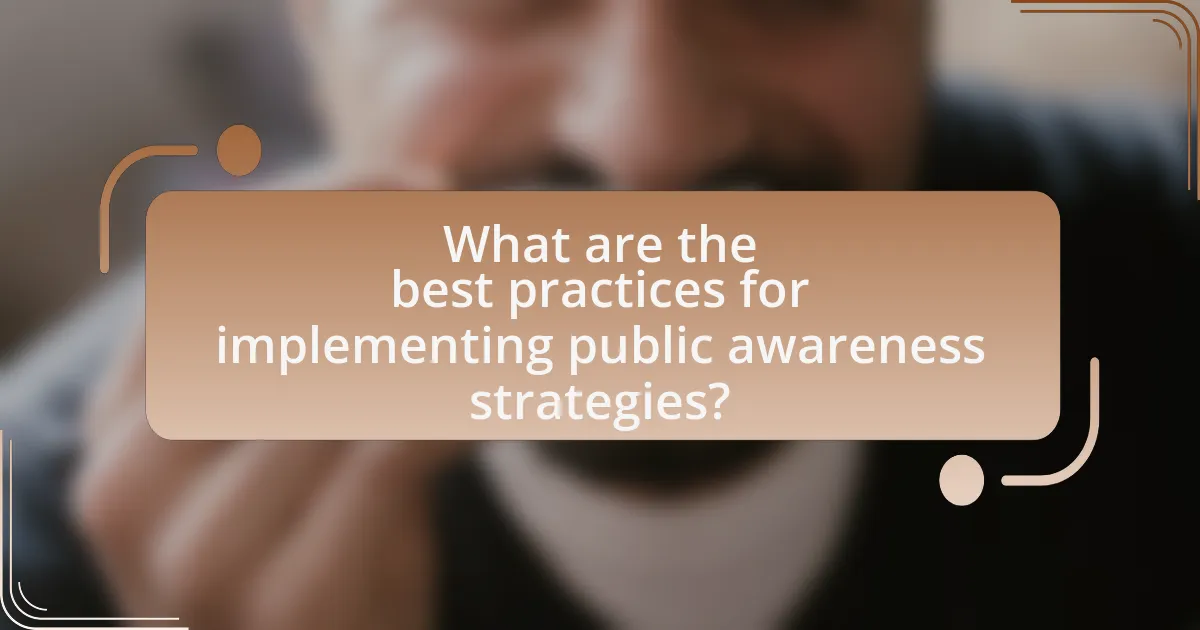
What are the best practices for implementing public awareness strategies?
The best practices for implementing public awareness strategies include identifying target audiences, utilizing multiple communication channels, and engaging stakeholders. Identifying target audiences ensures that messages are tailored to specific demographics, increasing relevance and impact. Utilizing multiple communication channels, such as social media, community events, and traditional media, maximizes reach and engagement, as evidenced by studies showing that campaigns using diverse platforms achieve higher visibility and effectiveness. Engaging stakeholders, including community leaders and health professionals, fosters trust and credibility, which is crucial for public acceptance, particularly in sensitive areas like cannabis legalization.
How can stakeholders measure the effectiveness of awareness campaigns?
Stakeholders can measure the effectiveness of awareness campaigns by analyzing key performance indicators (KPIs) such as reach, engagement, and behavior change. For instance, metrics like the number of impressions, social media shares, and website traffic can indicate how many people were exposed to the campaign. Additionally, surveys and pre- and post-campaign assessments can provide insights into changes in knowledge, attitudes, and behaviors related to cannabis legalization. Research shows that campaigns with clear objectives and measurable outcomes, such as the “Truth Initiative” campaigns against smoking, have successfully demonstrated shifts in public perception and behavior, reinforcing the importance of data-driven evaluation in assessing campaign effectiveness.
What metrics should be used to evaluate public awareness initiatives?
To evaluate public awareness initiatives, key metrics include reach, engagement, behavior change, and knowledge retention. Reach measures the number of individuals exposed to the initiative, indicating its visibility. Engagement assesses how actively the audience interacts with the content, often through likes, shares, or comments on social media platforms. Behavior change evaluates the extent to which the initiative influences actions or attitudes, which can be measured through surveys or observational studies. Knowledge retention gauges how well the target audience retains information over time, often assessed through follow-up surveys or quizzes. These metrics provide a comprehensive framework for understanding the effectiveness of public awareness initiatives in the context of health and cannabis legalization.
How can feedback be incorporated to improve future campaigns?
Feedback can be incorporated to improve future campaigns by systematically collecting and analyzing responses from target audiences. This process allows campaign managers to identify strengths and weaknesses in messaging, outreach methods, and overall effectiveness. For instance, surveys and focus groups can reveal public perceptions and misconceptions about cannabis legalization, enabling adjustments to educational content and strategies. Research shows that campaigns that adapt based on audience feedback can increase engagement by up to 30%, demonstrating the tangible benefits of incorporating feedback into future planning.
What tips can help individuals advocate for better public awareness on cannabis health issues?
Individuals can advocate for better public awareness on cannabis health issues by engaging in community education initiatives. These initiatives can include organizing workshops, distributing informative materials, and utilizing social media platforms to share evidence-based information about cannabis health effects. Research indicates that informed communities are more likely to support policies that promote public health, as seen in studies like the 2020 report by the National Academies of Sciences, Engineering, and Medicine, which highlights the importance of public education in shaping perceptions about cannabis. By fostering open discussions and providing accurate data, advocates can effectively influence public opinion and policy regarding cannabis health issues.
